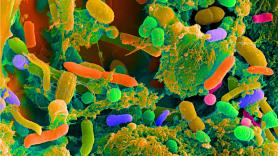2. Microbiome and disease
Key role in medicine
The microbiome plays a key role in medicine, as explained Dusko Ehrlich, head researcher on the Metagenopolis project in Jouy-en-Josas (France) and director of the Center for Host Microbiome Interaction at King’s College London (United Kingdom).
In his opinion, gut microbiota is a forgotten organ, made up of 100 trillion microorganisms, which is more than the number of cells in the human body.
“The microbiota is altered in patients with chronic illnesses. This alteration is often due to the loss of microbial richness and can even happen in healthy people. So, an intestinal microbiome poor in microbes is less healthy,” he warned.
New sequencing tools have proven particularly useful in studying alterations in the microbiome, as shown by studies like MetaHIT, although standardization of processes is key.
“Microbiome-based biomarkers can predict an illness precisely. And even the risk of developing a disease. This is why treating the microbial parts of our body to stay healthy and cure diseases is highly useful. And, as alterations in the microbiome can make diseases worse, restoring it should be beneficial,” he said.
The microbiome in infectious diseases
Vaginal microbiota also contributes to the risk of transmitting HIV, regardless of pre-exposure prophylaxis, as explained Nichole Klatt, professor at University of Washington (USA): Tenofovir in gel format was three times more effective in women with predominant vaginal Lactobacillus. This drug was not effective in women with non-Lactobacillus communities with large amounts of G. vaginalis.
Roger Paredes, head of Microbial Genomics at IrsiCaixa AIDS Research Institute and one of the scientific leaders of this B·Debate, is also doing research in this field. In his opinion, findings prove that after HIV infection the microbiome adapts to oxidative stress.
“This adaptation process can be self-perpetuating and contribute to chronic inflammation in the HIV infection. Acute HIV inflammation is characterized, among other factors, by a quick loss of gene richness, which doesn’t seem to recover,” he described.
Digestive diseases
Advances have also been made in Crohn disease. As explained Mahmoud Ghannoum, director of the Center for Medical Mycology at Case Western Reserve University in Cleveland (USA), Iliev’s work proved that fungi –and not bacteria- are responsible for increasing inflammation and the severity of intestinal disease, more than being a cause of these symptoms. In 2016, Hoarau confirmed the key role one fungus plays in the development of Crohn disease.
“There is clear proof of the microbiome’s contribution to colitis,” highlighted the expert. Harry Sokol, professor of Gastroenterology at Hospital Saint Antoine in Paris (France), reiterated the central role the microbiota plays in the pathogenesis of inflammatory intestinal diseases and that this is influenced by both genetic and environmental factors.
Another area of interest is the interaction of iron, vitamin D and uric acid in insulin resistance, fatty liver and the microbiota, as indicated José Manuel Fernández Real, chief of section at the Biomedical Research Institute of Girona (IdIBGi). “There is more and more proof that the microbiota regulates development of non-alcoholic fatty liver disease and non-alcoholic steatohepatitis. And these findings could have therapeutic implications,” he believes.
Microbiota and cancer
Finally, Laurence Zitvogel, researcher at the Gustave Roussy center in Paris (France) shared her belief that anti-cancer probiotics like Enterococcus hirae and Barnesiella intestinihominis will usher in a new age of immuno-oncology, with promising results already published for advanced lung tumors, ovarian cancer and kidney cancer.



